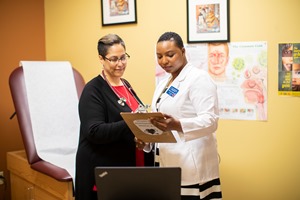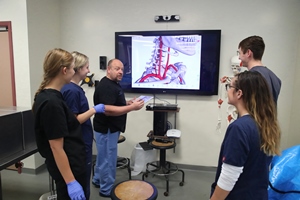Daemen Educating Future Health Care Professionals on Coronavirus
Apr 6, 2020
Daemen Educating Future Health Care Professionals on Coronavirus
Apr 6, 2020AMHERST, N.Y. – As the coronavirus pandemic continues to unfold, the impact of COVID-19 on patient care and health care professionals is being discussed with Daemen College nursing and physician assistant students in spring semester classes, which transitioned to an all online format last month due to the crisis.
“Nurses are on the frontlines of patient care and it is our responsibility to train our students on the most current precautions, protocols, and risks regarding COVID-19,” said Dr. Cheryl Nosek, chair of nursing. “The coronavirus will change education, the way we care for patients, and the course of health care in the future as more stringent universal precautions for nurses and other health care professionals will likely be instituted. As we learn more about the coronavirus, we are integrating these new educational components into our curriculum.”
Nosek noted that Daemen’s “Population Focused Community Health” nursing course has already added a focus on keeping nurses healthy during a public health crisis like the coronavirus pandemic and anticipates modifications in other courses in the coming weeks and months.
“The COVID-19 crisis has been very traumatizing to nurses who are working in the midst of this pandemic,” said Nosek. “While we currently address this in our ‘Holistic Perspectives’ course, we recognize there is an even greater need to ensure our nursing students are educated about dealing with extreme stress.”
Nosek has been actively involved in the New York State Council of Deans discussions on the coronavirus, nursing education, and the profession as a whole. “In the wake of this global health crisis, we expect there will be a need for more advocacy and legislation for the nursing profession, all of which will impact our students and graduates in the nursing field,” said Nosek.
For Daemen’s physician assistant students assigned to supervised clinical practice experiences, they have received training in an area crucial to protecting health care workers.
“An online tutorial with an assessment on COVID-19 and the proper use of personal protection equipment (PPE) was immediately shared with students when the coronavirus began to emerge in the U.S.,” explained Dr. Gregg Shutts, chair of physician assistant studies. “In addition to learning the proper use of PPE, students are being educated on the vital role of physician assistants in critical care, including ventilator management.”
Shutts has been meeting weekly as a member of the Accreditation Review Commission on Education for the Physician Assistant (ARC-PA) Executive Committee to provide guidance on the country’s physician assistant programs during the pandemic. He is also serving on the joint ARC-PA and Physician Assistant Education Association Coronovirus Task Force.
New York Gov. Andrew Cuomo’s recent executive order that gives physician assistants more flexibility in the state will be crucial to the profession and will impact future physician assistants like those being educated at Daemen.
“The physician assistant profession has been advocating for legislation to remove restrictions that limit the ability of PAs to meet the needs of the community during times of disaster, like the coronavirus pandemic,” said Shutts. “The governor’s executive order allows PAs to deliver medical services appropriate to their education, training, and experience without oversight from a supervising physician, a change that is being discussed with students in our classes.”
According to Shutts, “A remarkable 91 percent of Daemen’s clinical year physician assistant students recently responded they would volunteer in local hospitals if called upon to support clinical staff during the pandemic, which clearly speaks to their dedication as future physician assistants and the profession.”

